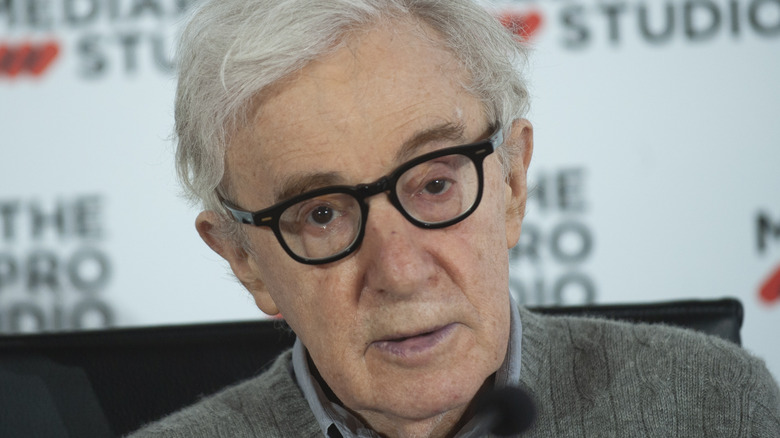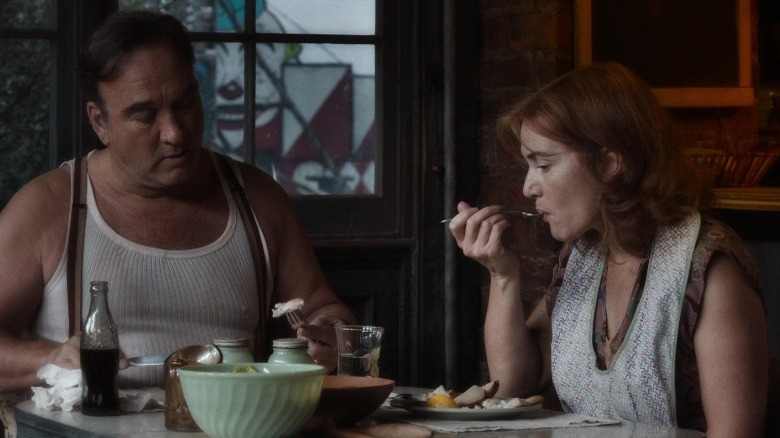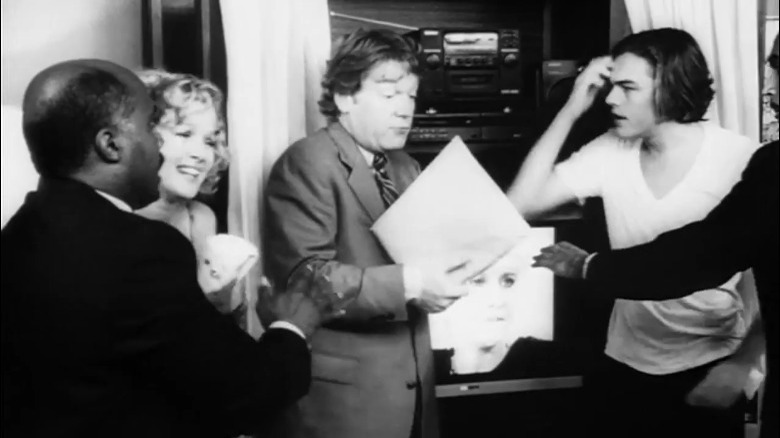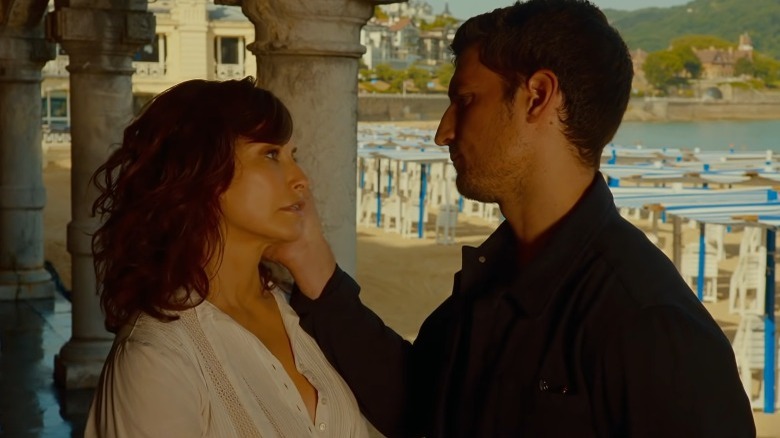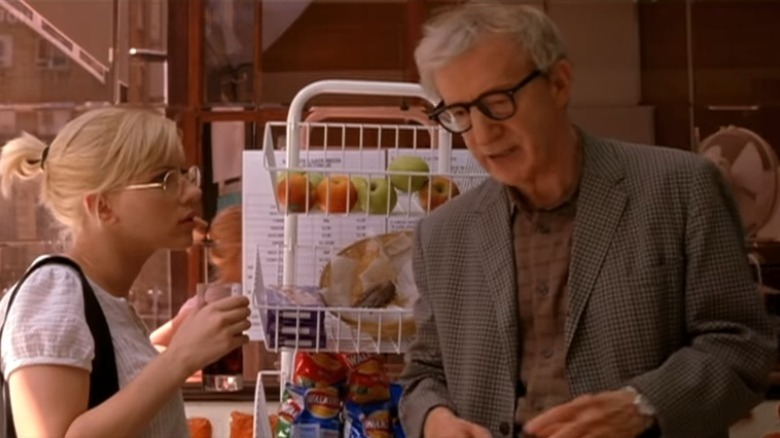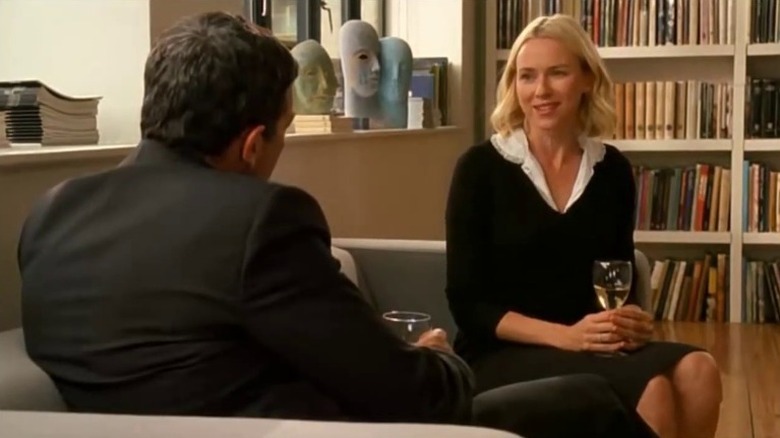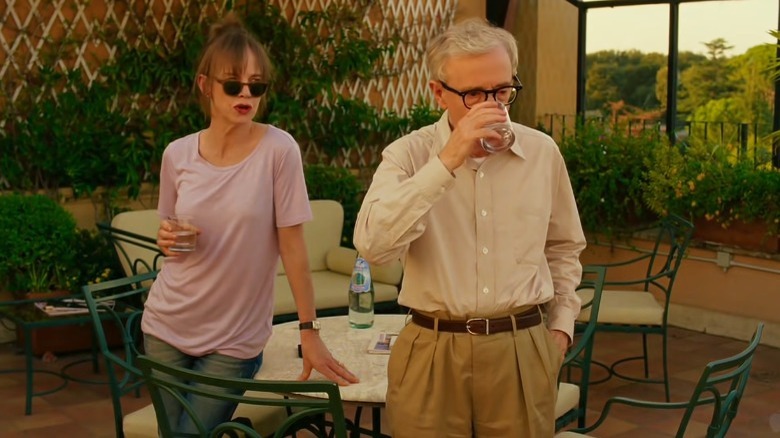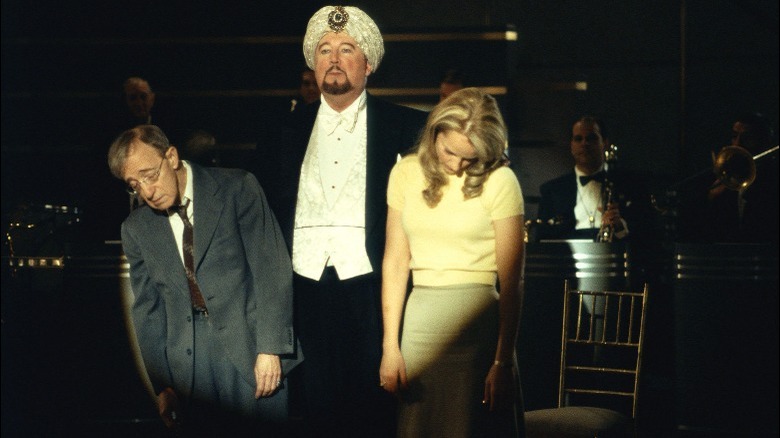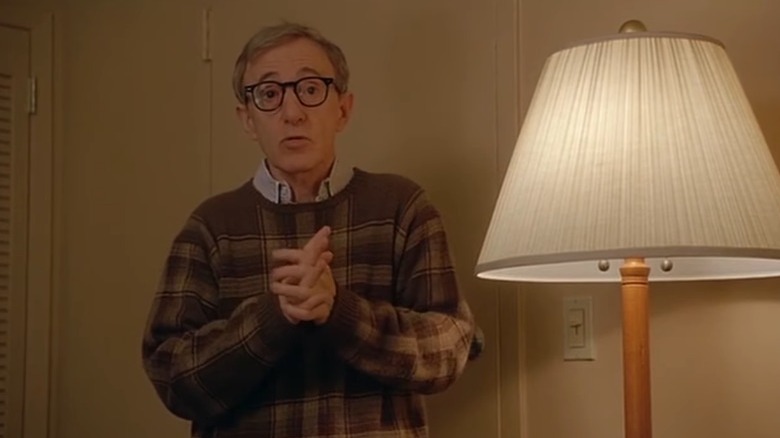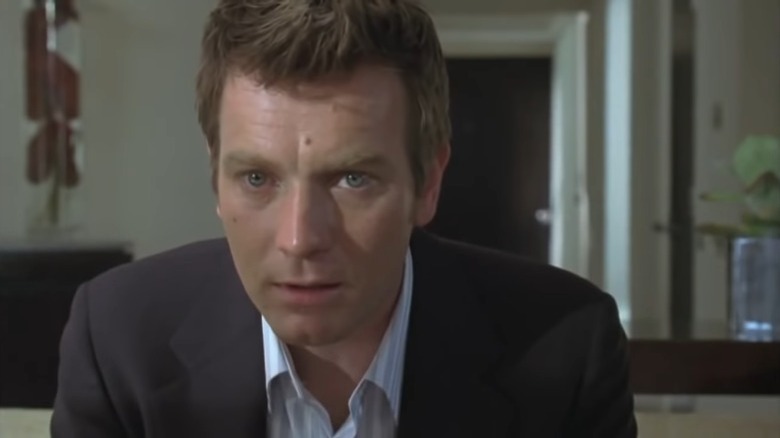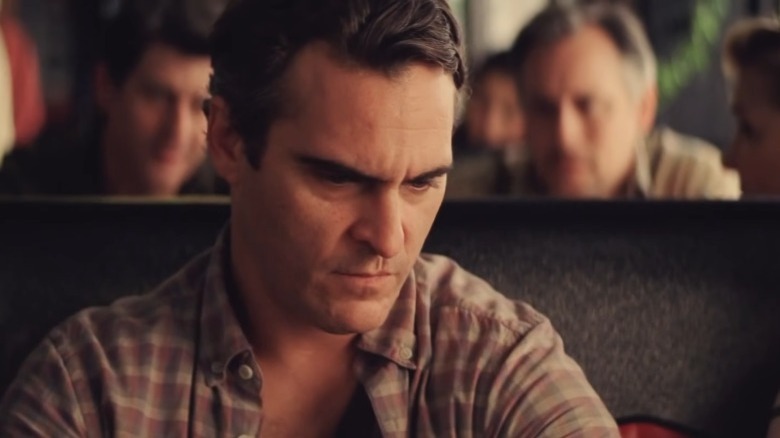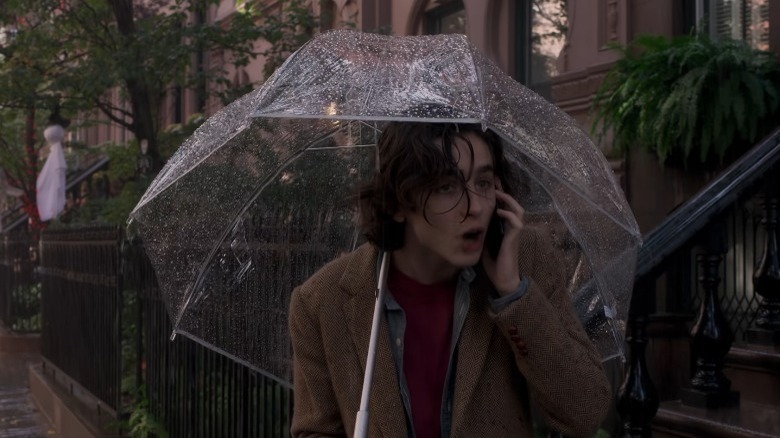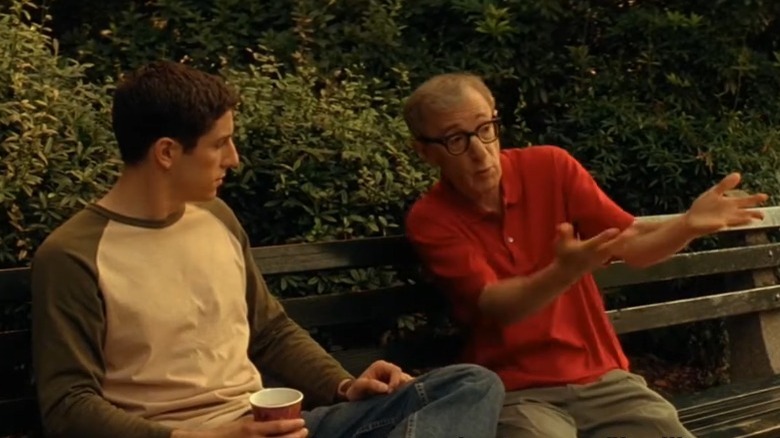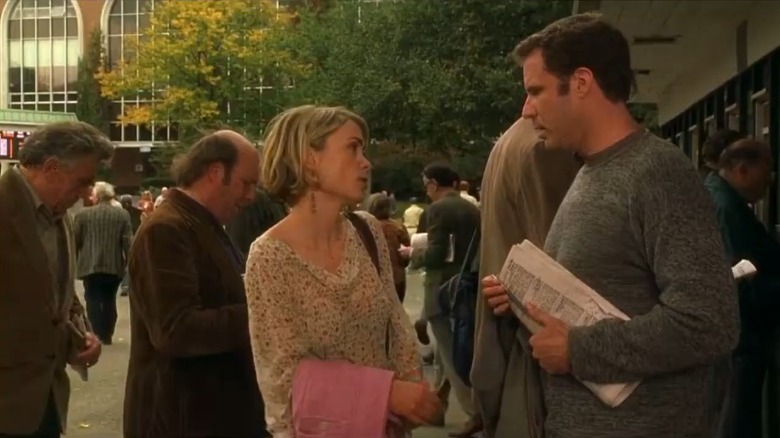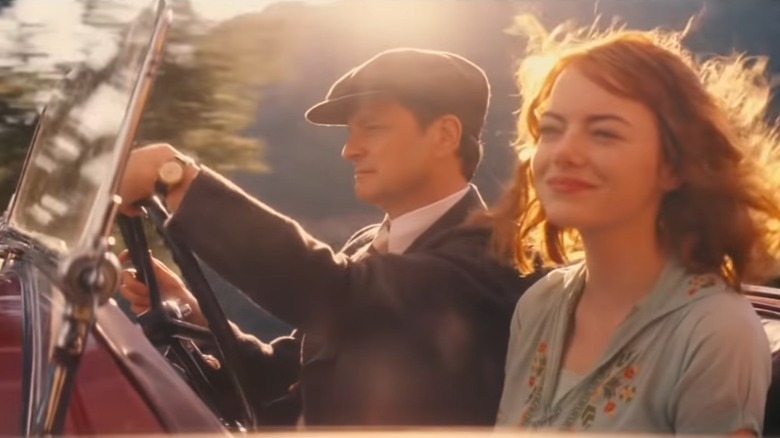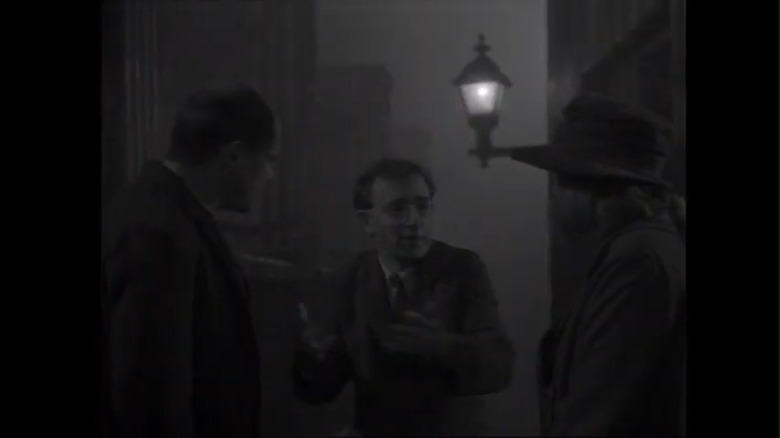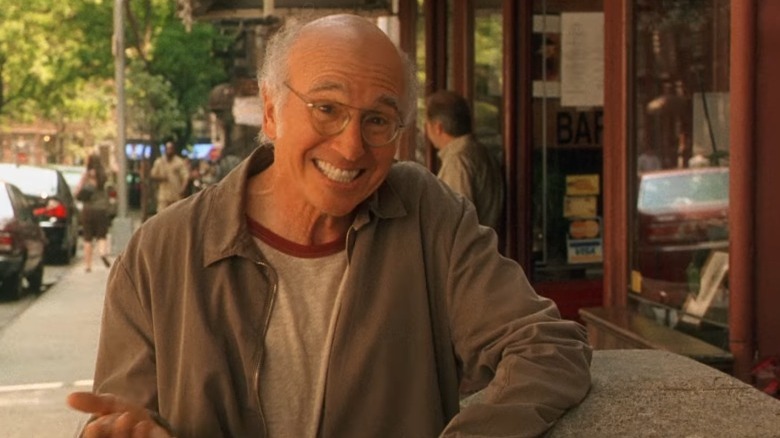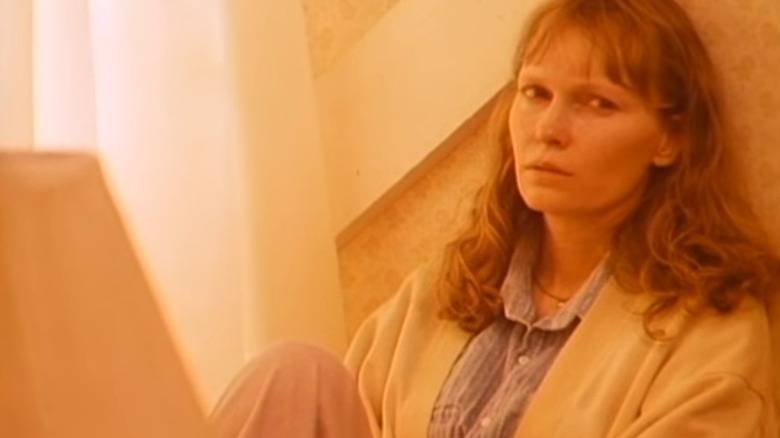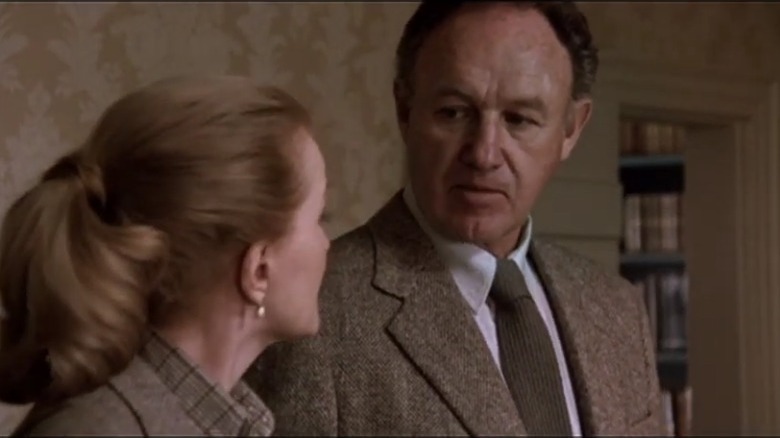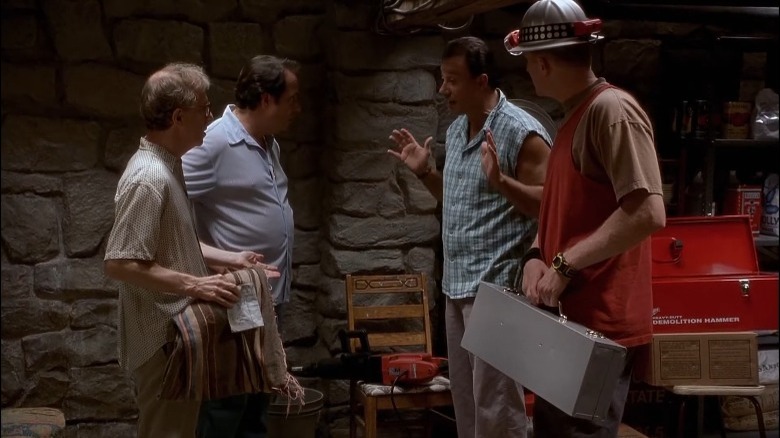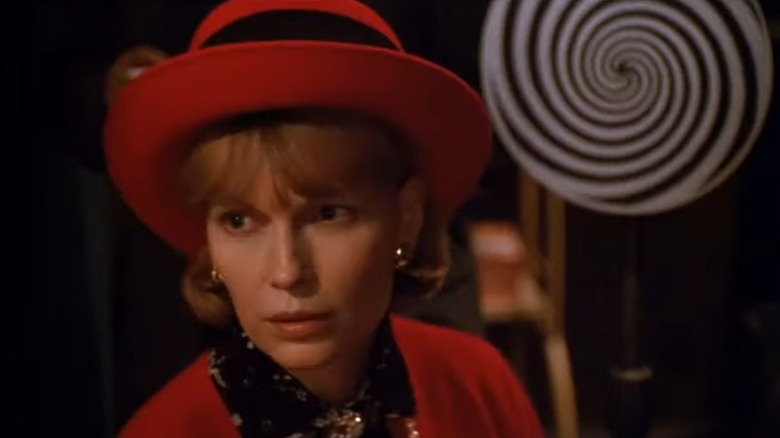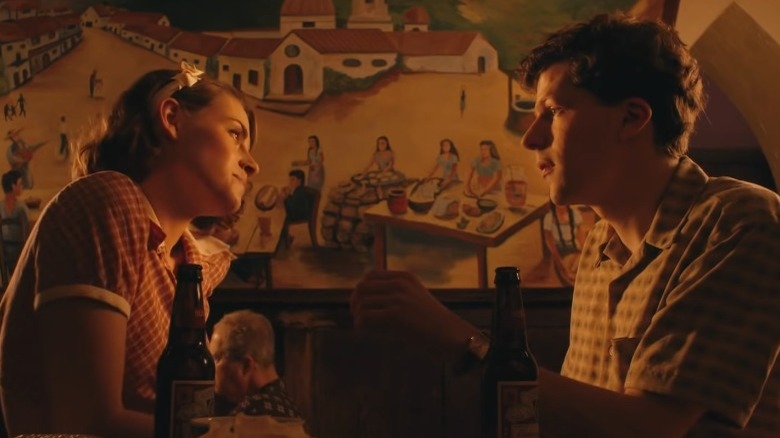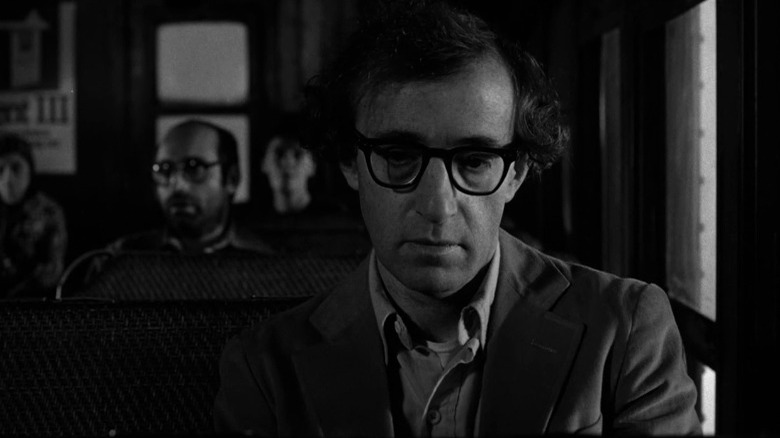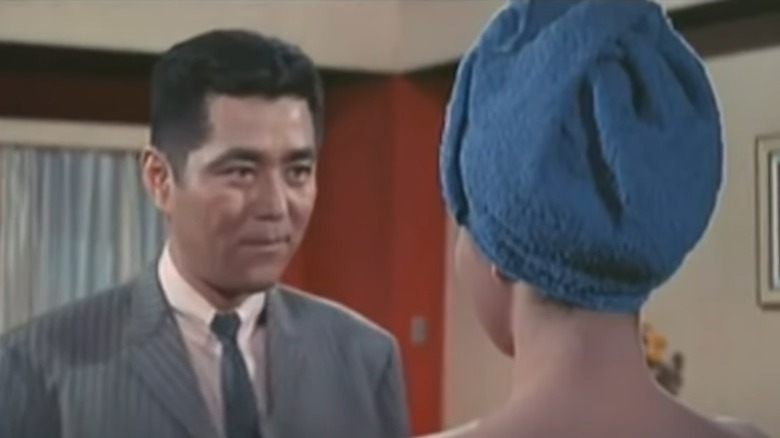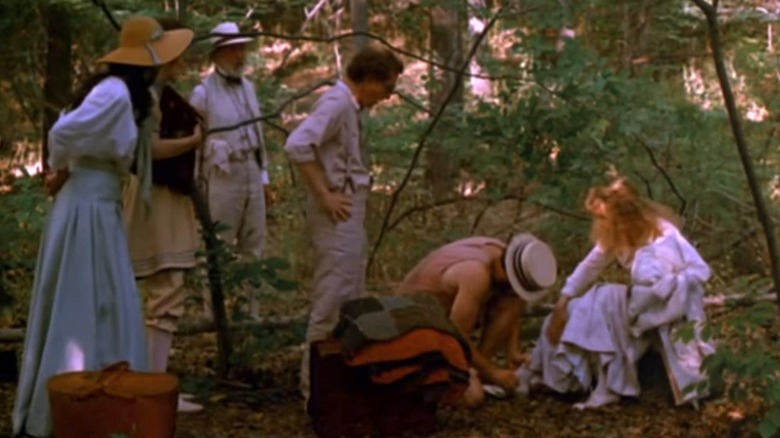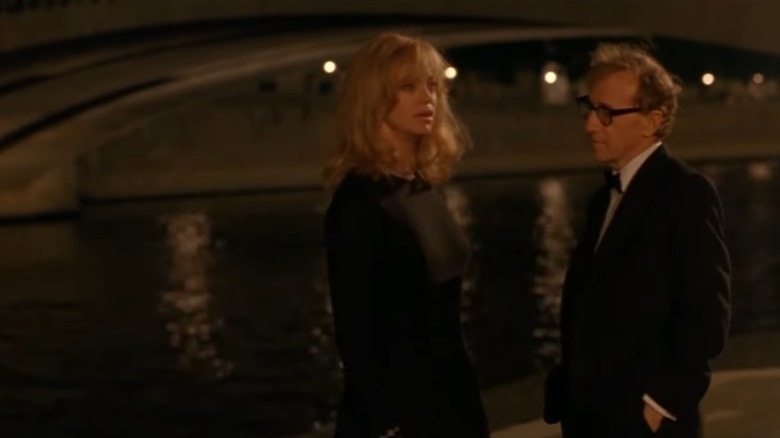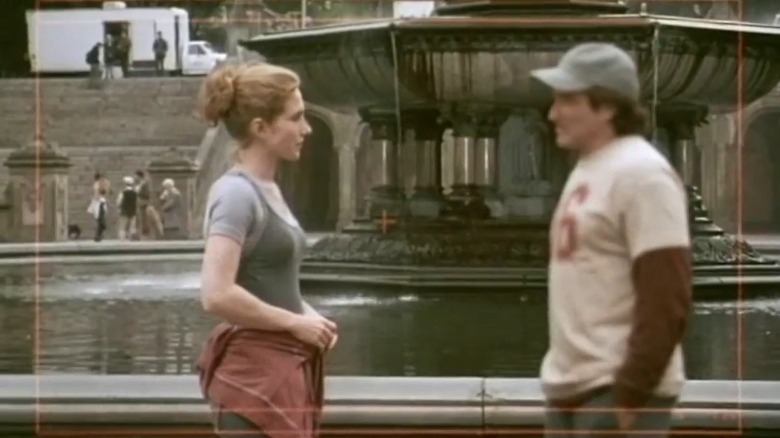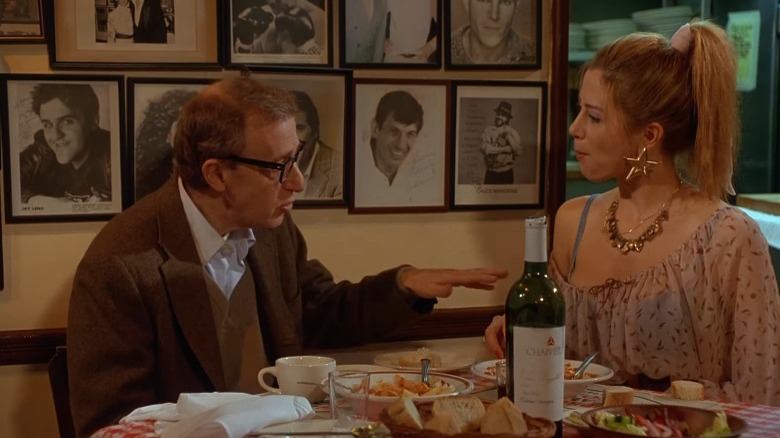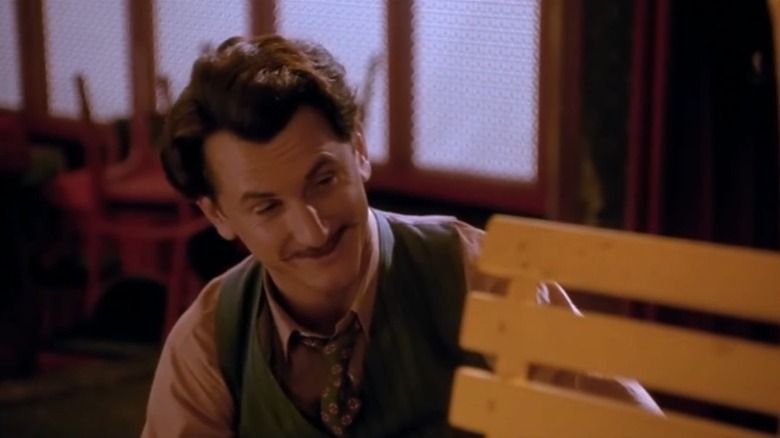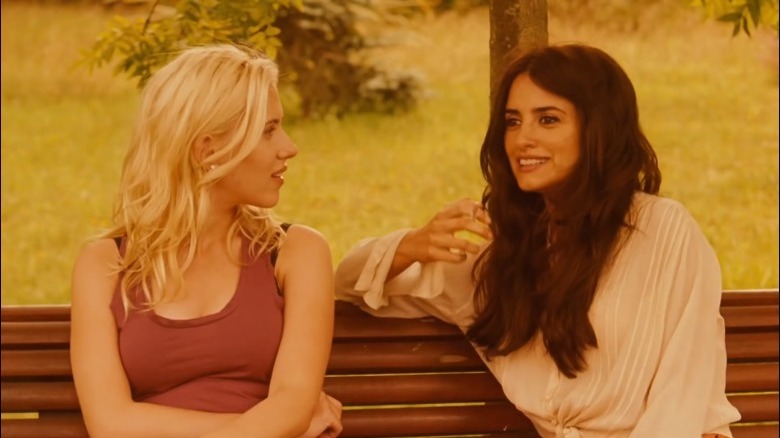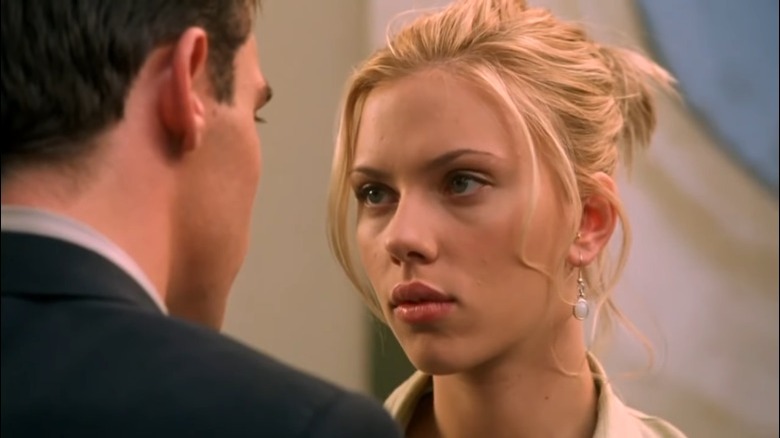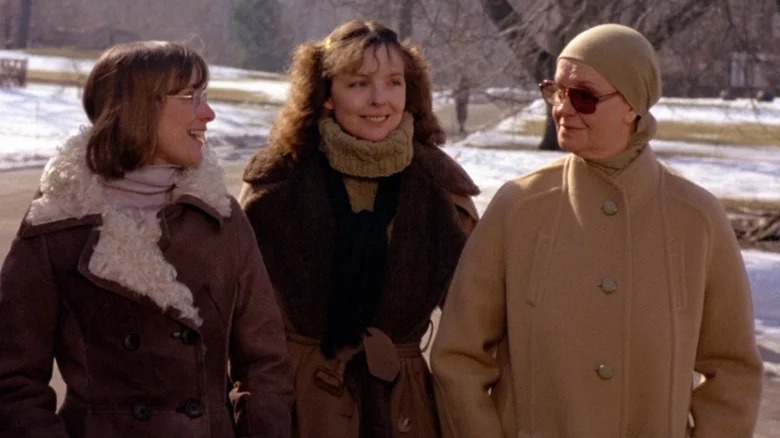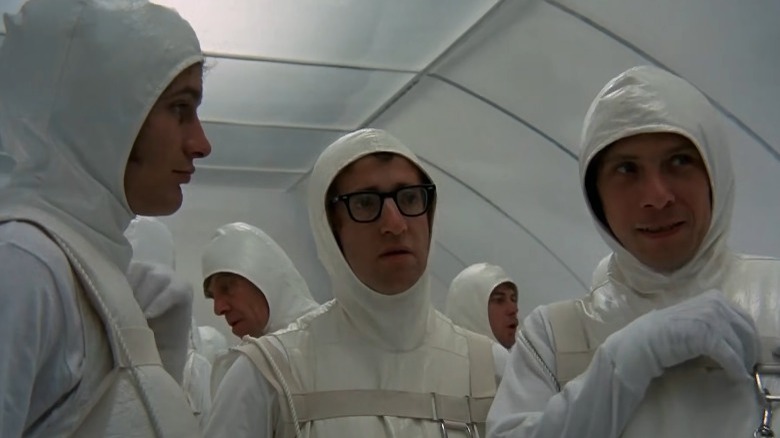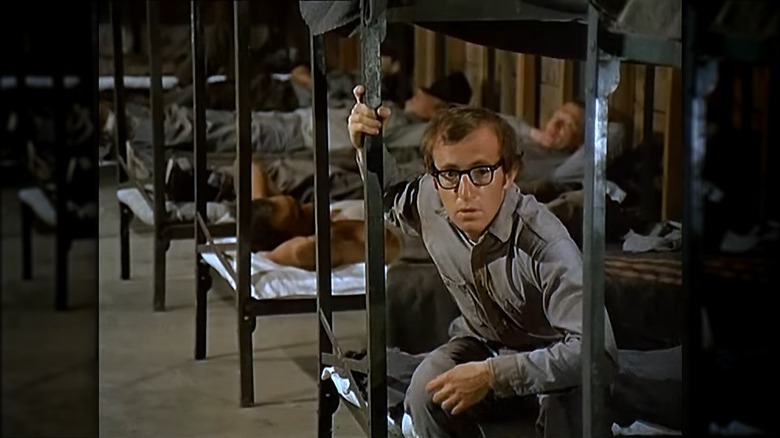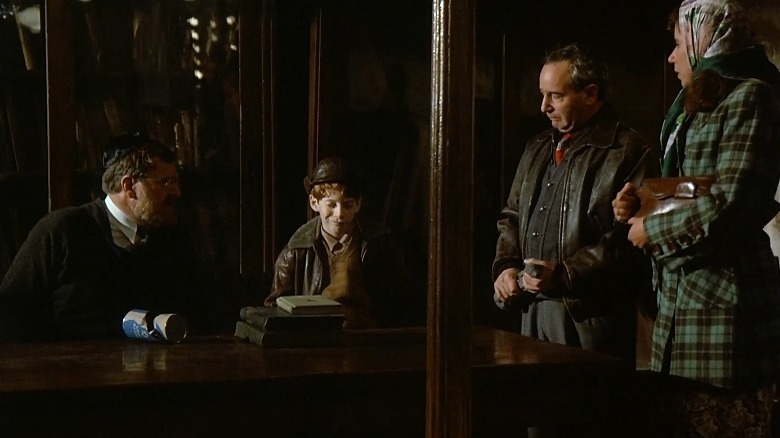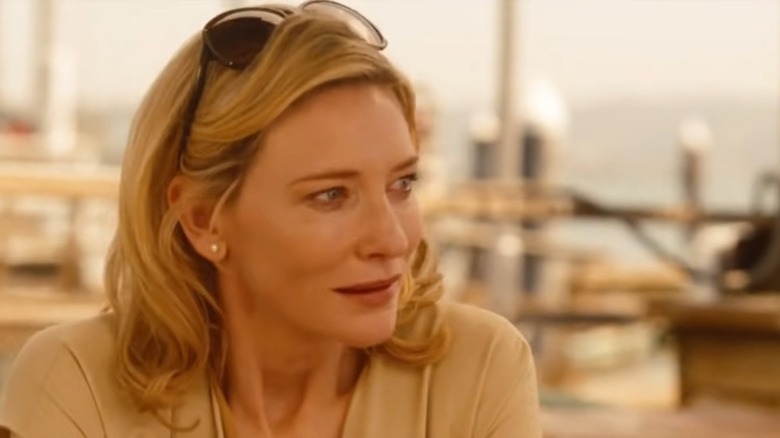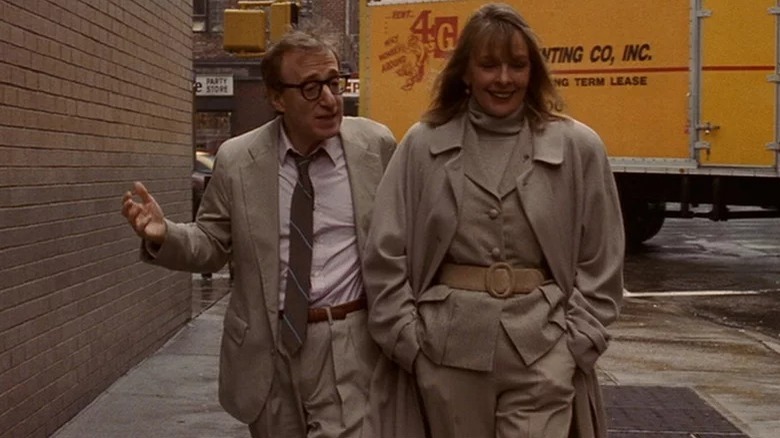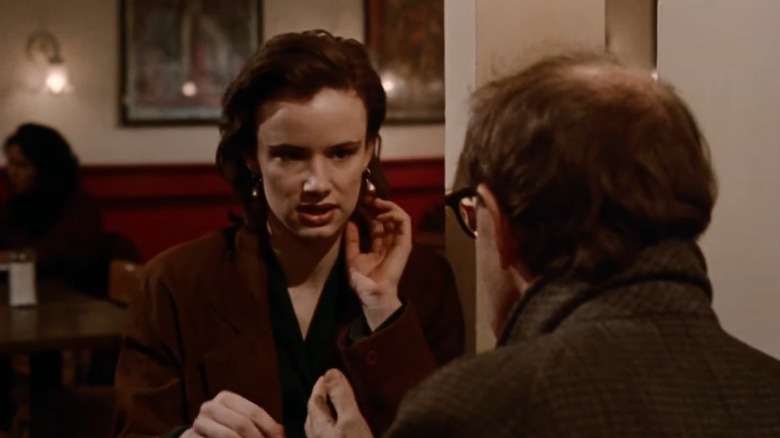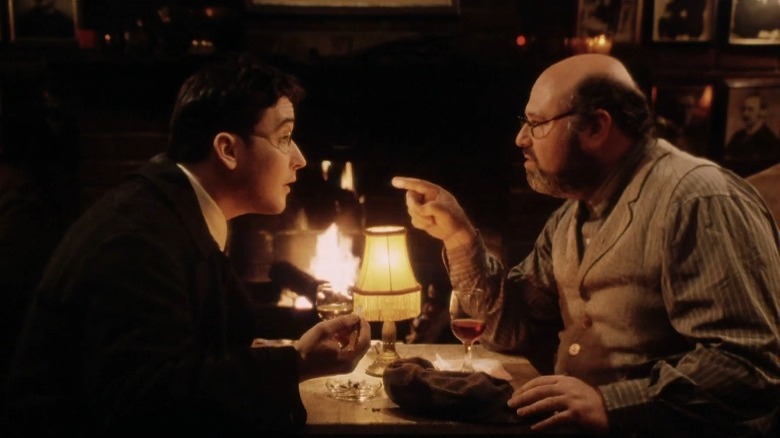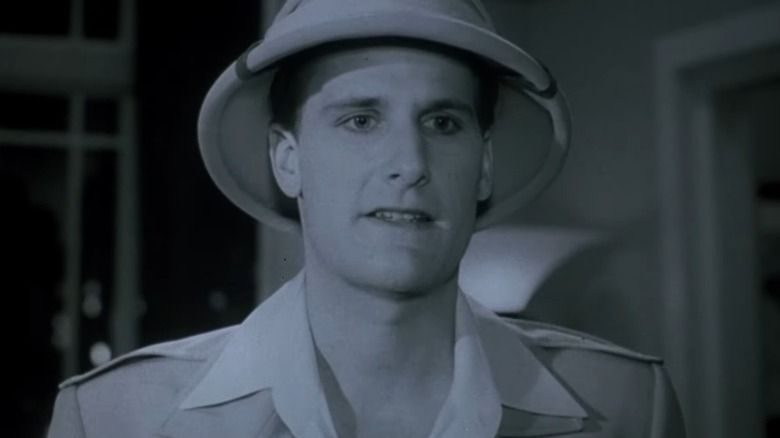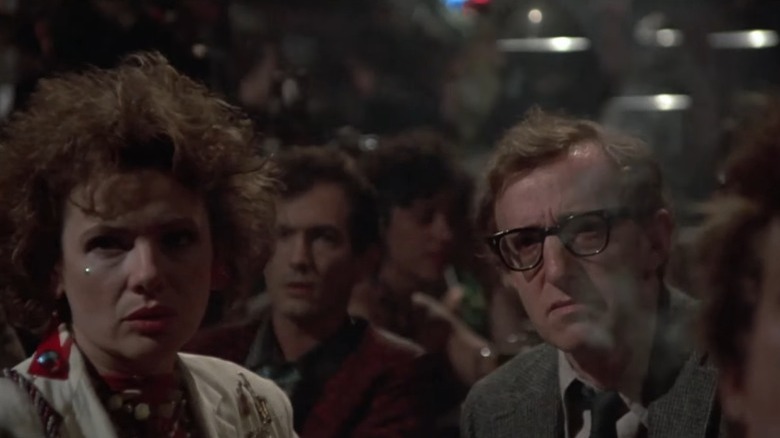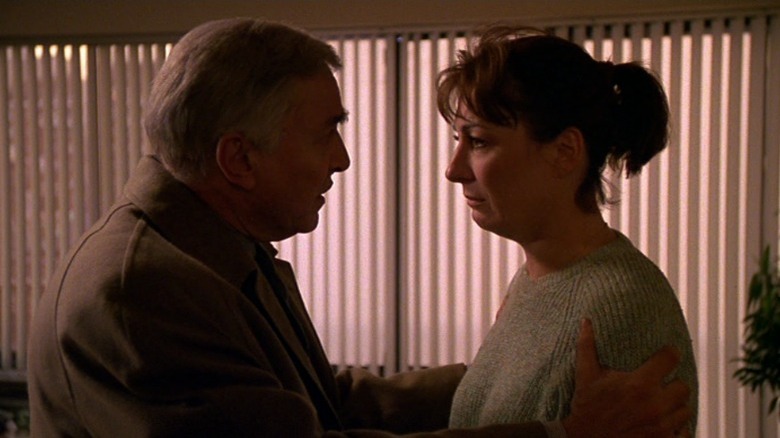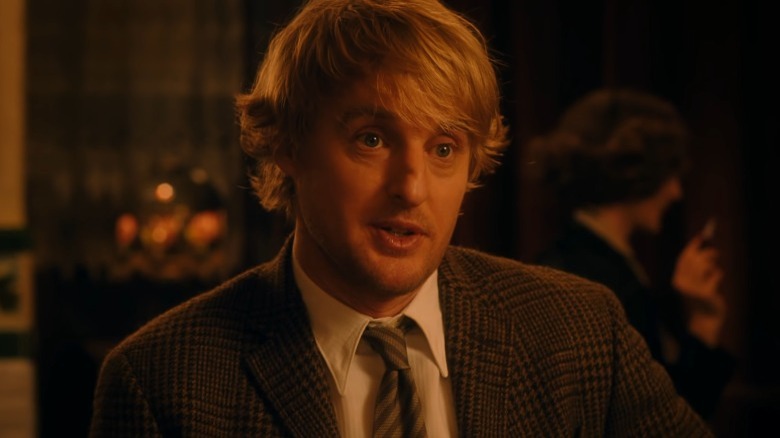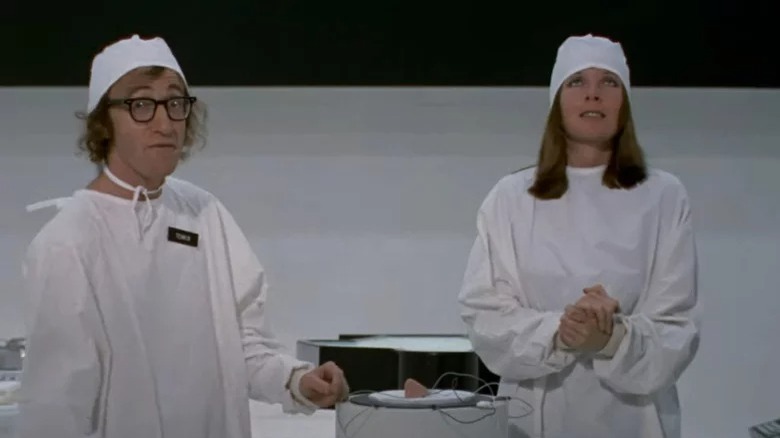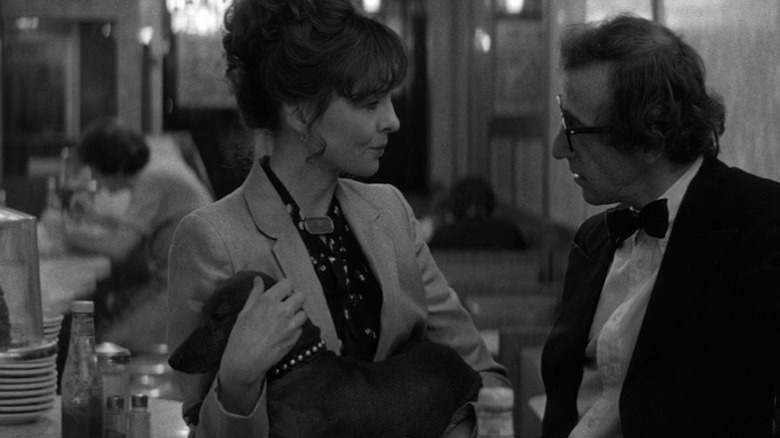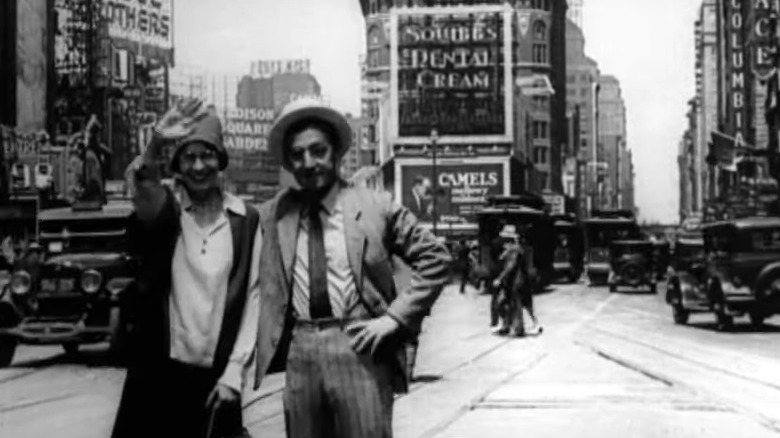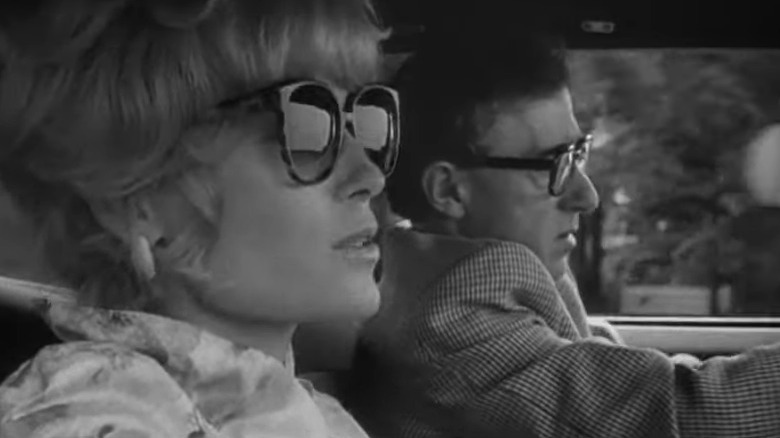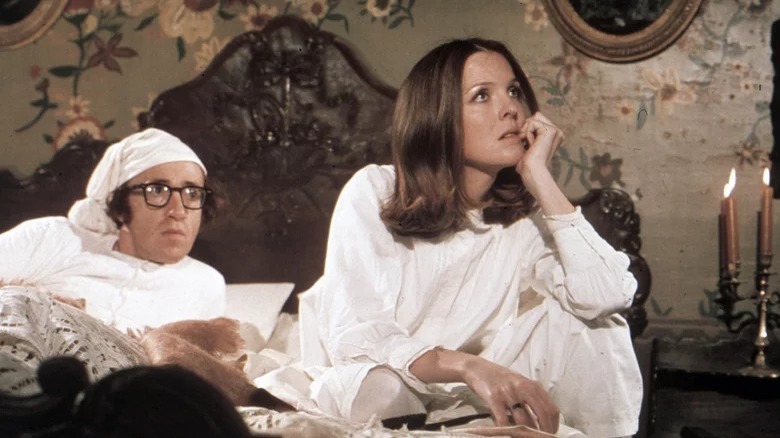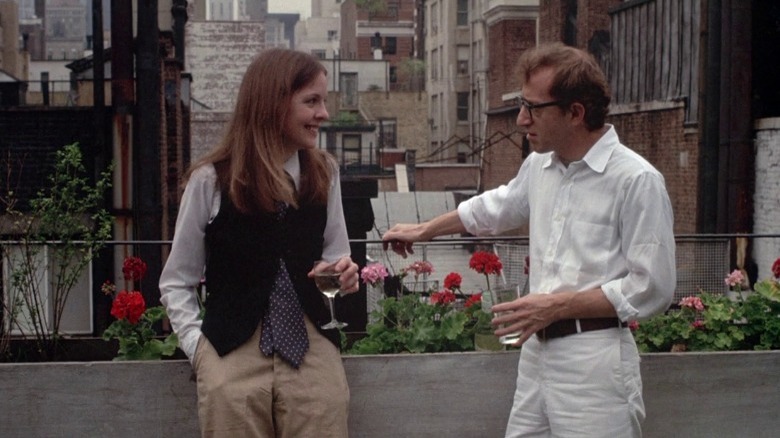Every Woody Allen Movie Ranked
Love him or hate him, it's hard to argue that Woody Allen doesn't make spectacular movies. The erudite, self-deprecating writer, actor, director and playwright began his career as something of a wunderkind joke writer in the 1950's, and by the mid-'60s had launched an unprecedented streak of films whose output nearly averaged one a year into the 2020s. Initially, he built this career on comedies like "Bananas" and "Take the Money and Run," but into the '80s and early '90s he began tackling dramatic themes ("Another Woman," "Alice") and his most beloved films ("Annie Hall," "Crimes and Misdemeanors") seem to exist at a point in-between — although he has been known to dip a toe into fantasy ("Midnight in Paris"), musicals ("Everyone Says I Love You") and even sci-fi ("Sleeper").
When a career stretches across seven decades, not everything is going to be a hit. But Allen has directed an amazing 18 actors to Oscar nominations (with seven wins), and himself won four Oscars. Because his films typically cost almost nothing to make, they tend to bring in enough cash to keep Allen going, year after year.
These days, Allen's appearances in the news are almost always about the disturbing allegations that have been made against him; nevertheless, he continues working as he approaches his nineties. As of 2022, Allen has directed 49 feature films — here's a ranking of them all.
49. Wonder Wheel (2017)
A high-profile Amazon Studios production set against the backdrop of Coney Island in the 1950s, "Wonder Wheel" harkens back to the Allen of "Radio Days" and stars Kate Winslet, Jim Belushi, Juno Temple, and Justin Timberlake in a story about unrealized dreams and relationships.
With Winslet as a failed actress-turned-clam house waitress, married to a miserable carousel operator (Belushi), and Timberlake as a lifeguard/wannabe playwright, like many Allen films, it centers on forbidden romance. Juno plays Carolina, the estranged daughter of Belushi's character, hiding out in her father's apartment from gangsters — much to the chagrin of Winslet.
While the setting and cinematography of this late-era Allen flick were praised upon the film's release, as was Winslet's performance, there isn't much else going for it. Overall, the film follows its protagonists' journeys of unrealized dreams, and most critics seemed to view the film as Allen spinning his wheels.
Which makes sense, because the film features some Allen staples — Coney Island, breaking the fourth wall, a romanticized New York and people who can't seem to get out of their own way. "Wheel" has consistently ranked among Allen's lowest graded films since its release.
48. Celebrity (1998)
Featuring an all-star ensemble cast, this late-'90s Allen effort centers around a failed novelist (Kenneth Branagh) who winds up writing about celebrities to pay the bills. This comes after an inconvenient midlife crisis/divorce leaves him reeling at a time when he expected his life to be relatively on track. Instead, he finds himself caught up in the affairs of the people the public tends to collectively celebrate.
Instead of writing novels, Branagh's character is thrust into wild sexual escapades that do little to sate his dissatisfactions; his ex-wife (Judy Davis), meanwhile, has similarly found herself thrust into a life of celebrity, but in an entirely antithetical manner. She's happy and fulfilled; he is not.
The cast for "Celebrity" (Melanie Griffith, Winona Ryder, Leonardo DiCaprio, Charlize Theron) put the film on radars when it was released, and as an analysis of the meaning of the word "celebrity," it works. It's also an interesting film because as Allen's age became more of an obstacle in the '90s, he began casting others in the neurotic, leading-man roles he once played; while some have done it well (Larry David in "Whatever Works," Timothée Chalamet in "A Rainy Day in New York"), Branagh's Woody is more an impression than a lived-in character.
Ultimately, the film's attempts to take a critical look at modern celebrity is undermined by Allen's apparent love of the subject, resulting in a missed opportunity.
47. Rifkin's Festival (2020)
In "Rifkin's Festival," Wallace Shawn plays Mort Rifkin, a film studies professor retired from teaching and intent on writing a novel. He's married to Sue (Gina Gershon), a publicist who works closely with people in the entertainment industry. Mort realizes that his relationship with his wife is waning, so he takes Sue to the San Sebastian Film Festival in Spain to reignite the spark of their relationship.
Sue's close working relationship with director Philippe (Louis Garrel) shows signs of straying from professional into personal, further dividing the couple. This leads Mort to take notice of Jo (Elena Anaya), a young woman with her own marital problems. Before long, they find that they're kindred spirits, as Jo's intelligence and familiar situation draw them together. Meanwhile, Sue and Philippe's interests continue to align, furthering the divide between Mort and his wife.
"Rifkin's Festival" is Woody Allen's 49th feature film, and it delves into familiar subject matter. The director handled similar fare far better in previous films, making "Rifkin's Festival" seem tired and overdone. Critics weren't kind to the film, as many declared it derivative of his earlier work. Elizabeth Weitzman of TheWrap wrote, "Allen returns to a well that is not so much dry as desiccated."
46. Scoop (2006)
Scarlett Johansson spent a significant time as Woody Allen's muse via three films ("Match Point," "Scoop," and "Vicky Cristina Barcelona"), and while the other two became late-career classics for Allen, this installment was far and away the most poorly received.
Centered around Johansson's Sondra Pransky, an American journalism student in London, the film has her character investigating a murderer dubbed the "Tarot Card Killer." The high-concept comedy kicks in when she takes part in a magician's performance; while inside his magic box, she meets the ghost of an investigative reporter who was nearly able to uncover the identity of the Tarot Card Killer before his own end.
While a tad unorthodox, getting the scoop from a ghost lands Sondra the story of a lifetime, and she's soon caught up with a British aristocrat, played by Hugh Jackman, who may just be the killer ... and the love of her life. While "Scoop" isn't one of Allen's greatest films, it delves into the themes that made him a great writer. Unfortunately, this nostalgia is bittersweet since he can't do much with it.
45. You Will Meet a Tall Dark Stranger (2010)
When 40 years of marriage proves too much for Alfie (Anthony Hopkins), he leaves his wife Helena (Gemma Jones) for a prostitute. Helena is left with an undeniable sense of abandonment at her husband's betrayal, which leads her to take solace in the advice of a psychic. Meanwhile, the couple's daughter, Sally, is having her own problems with love, leading her to stray from her husband into the arms of her boss.
She's not the only one to stray, as her husband finds himself pining for another woman, though she's engaged to be married. "You Will Meet a Tall Dark Stranger" is like many other Woody Allen films in that it involves a series of complex relationships that are equally similar and entirely indifferent to one another. This constructs a somewhat relatable situation that would have been more effective had it not been explored in earlier, better movies in his filmography.
Like many of Allen's later films, it features an all-star cast, but even the likes of Hopkins, Jones, Antonio Banderas, and Josh Brolin couldn't elevate this web of relationships to the likes of "Deconstructing Harry," "Play It Again Sam," or "Annie Hall," all of which did it so much better.
44. To Rome with Love (2012)
In his early work, Woody Allen often played the protagonist — but since he stopped doing this around the turn of the century, he rarely appears in front of the camera anymore. "To Rome with Love" is the last of his films in which he appeared before the camera — he would appear a year later in someone else's film ("Fading Gigolo"), and after that in his Amazon miniseries "Crisis in Six Scenes."
"Rome" is an unusual film for Allen, broken up into four separate vignettes, all unrelated except for the titular setting. Overall, the film could be filed under "romantic comedy," and like most modern Allen films, features an all-star, ensemble cast.
Allen taps the talents of Penelope Cruz, Alec Baldwin, Jesse Eisenberg, Greta Gerwig, Roberto Benigni, and Elliot Page, among many other notable stars. Allen's role in the film arrives when he and his wife travel to Rome to meet the man their daughter intends to marry. The second vignette is lifted from Fellini's "The White Sheik," while the third features a man who awakens to find everyone believing him to be a national celebrity.
The fourth and final vignette features two newlyweds traveling to Rome to visit family, but they get lost in their exploration. "To Rome with Love" was a triumphant return to form for Allen, who kept his winning streak strong after releasing "Midnight in Paris" the previous year.
43. The Curse of the Jade Scorpion (2001)
A period piece set in the 1940s, "Scorpion" casts Allen as an insurance investigator whose ability to get into the minds of his targets helps to crack any caper that lands on his desk. This changes when a stage magician hypnotizes him, getting into his mind in a way he couldn't have imagined.
The crooked hypnotist uses the insurance investigator and his associate efficiency expert (Helen Hunt) to steal jewels for him, making them part of the caper they're investigating. The film is an homage to film noir movies, though it's in color, which somewhat undermines the theme. After all, it's not like Allen hasn't made plenty of black and white films.
Allen's penchant for playing the lead in his films ran into problems with "The Curse of the Jade Scorpion," as he took the part reluctantly. The director offered the role of Briggs to other stars, but finally took it when nobody else would. This led to a film Allen considers his worst, which he credits to his role in the lead, as well as cost overruns that made reshoots impossible. The end result is a movie that fails to capture the director's vision for what sounds like a promising idea.
42. Hollywood Ending (2002)
"Hollywood Ending" stars Woody Allen as Val Waxman, a once-acclaimed film director who is now past his prime and directing commercials. All Waxman wants is to direct another big-budget blockbuster, and when he gets one handed to him out of the blue from his ex-wife and her boyfriend, he is at first apprehensive.
His agent manages to get Waxman to sign on for the picture, but it comes at a cost. The stress results in sudden hysterical blindness, leaving him incapable of seeing anything as production begins. Despite this, he continues to direct the film while simultaneously working to reform his relationship with his estranged son, Tony. He also rekindles his romance with his ex; as things get better in his life, he regains sight.
Unfortunately, this allows him to see how terrible his film is, and it bombs. For some reason, it's successful in France (not unusual for a Woody Allen film), leading to a new chapter in his career as he's invited to the country to direct another movie. "Hollywood Ending" has some funny moments, and inevitably can be read as somewhat autobiographical, but it is often overtaken by a silliness that may have worked years earlier in films like "Sleeper," but should have been cast to the cutting room floor in the 21st century.
41. Cassandra's Dream (2007)
Straying from his usual comedic roots via a thriller (starring Colin Farrell and Ewan McGregor), in this film Allen tells the tale of brothers Terry and Ian, who purchase a sailboat they christen "Cassandra's Dream." The name comes from the greyhound Terry (Farrell) bet on, which earned him the money to buy the vessel. Following a day of sailing in the sun, Ian spots a stunning actress, Angela Stark (Hayley Atwell), and is infatuated.
The brothers next diverge into their own stories, where Terry's gambling leads him in debt, and Ian seeks money through investments so he can move to California and be with Angela. To get some cash, they turn to their uncle, Howard, who asks them to kill a rival in exchange for his help. Despite their reluctance, they agree to take on the task, which they accomplish with some difficulty.
The murder leaves Terry with overwhelming guilt, while Ian just wants to move on. This leads to a bitter rivalry between the brothers that leads to an inevitably disastrous conclusion. "Cassandra's Dream" did remarkably poorly at the box office despite excellent performances by everyone involved. Fortunately, it did gangbusters in international markets, so it wasn't a total loss.
40. Irrational Man (2015)
In "Irrational Man," Joaquin Phoenix plays Abe Lucas, a philosophy professor undergoing an existential crisis where he's incapable of finding meaning in his life. This leads to depression and alcoholism and somehow, the affections of a fellow professor, Rita (Parker Posey), and one of his students, Jill (Emma Stone). Abe begins a sexual relationship with Rita and starts a platonic relationship with Jill.
When he learns of a corrupt judge, Abe decides to kill him. This gives his life purpose, so he sets to the task, following the judge and noting his activities. Abe uses Rita's chemistry lab to procure cyanide, which he uses to kill the judge. This gives him a new lease on life, which pushes his relationships further with Rita and Jill, whom he finally sleeps with. Ultimately, the women begin to suspect Abe's activities, leading to a confrontation and conclusion that few could have seen coming.
Allen's attempt at depicting the resolution of an existential crisis via a murder plot ultimately lacks profundity and moral realism. It's difficult to understand the protagonist's motives, as they aren't relatable, though the title can be seen as a warning. As a result, "Irrational Man" fails to deliver what could have been an intriguing murder fantasy film.
39. A Rainy Day in New York (2019)
"A Rainy Day in New York" is centered around Gatsby (Timothée Chalamet) and Ashleigh (Elle Fanning). The two college students find themselves on a weekend trip to New York City, where Gatsby aims to solidify their relationship. Ashleigh is in the city to interview a famous director (Liev Schreiber) for their college paper. The film is similar to Allen's previous works in multiple ways, once again leading to a poorly received movie critics likely felt they had seen before.
While the movie itself isn't one of Allen's greatest, it became big news upon release for something that had nothing to do with its production. Amazon Studios was supposed to release it in 2018, but when Allen's name got caught up in the #MeToo movement in regards to his past sexual abuse allegations, Amazon sat on the movie. For the first time in nearly 30 years, Allen didn't release a film in a calendar year, leading to a lawsuit.
The whole thing was eventually resolved, and "A Rainy Day in New York" was released on Amazon Prime. The mess surrounding its distribution rights and eventual release marred an otherwise decent film in controversy, rendering it effectively dead on arrival when it was finally released in 2019.
If you or anyone you know has been a victim of sexual assault, help is available. Visit the Rape, Abuse & Incest National Network website or contact RAINN's National Helpline at 1-800-656-HOPE (4673).
38. Anything Else (2003)
In "Anything Else," Jason Biggs plays Jerry Falk, an Allen-like writer in New York City who becomes infatuated with Amanda (Christina Ricci). Of course, he's already dating someone at the time (as is Angela), but that doesn't stop them from cheating on their respective partners with one another. Eventually, Amanda leaves her boyfriend, and Jerry's girlfriend dumps him, ensuring they wind up together.
Despite landing the girl of his dreams, Jerry has a lot of neuroses (typical of a protagonist in a Woody Allen film), and he seeks mentorship from an older man, David Dobel (Allen). David helps Jerry sort out his various issues, and before long, tells him Amanda is hurting him much more than she's helping him. That's primarily due to her wonton infidelity, which elevates Jerry's neuroses to impossible levels.
Eventually, Amanda leaves him to pursue an affair with her doctor, and Jerry takes a job writing for television in California. When he tells a cab driver of his troubles, the man simply replies, "It's like anything else." The film was unsuccessful, as it pulled aspects of Allen's earlier work into a recycled form. His critics called him on this, and "Anything Else" was a critical and commercial failure.
37. Melinda and Melinda (2004)
Woody Allen explores the nature and duality of life by examining one woman through the lenses of comedy and tragedy. "Melinda and Melinda" centers on the opening act's premise, as stated by four writers having dinner. They pose the question "Is life naturally comic or tragic?" and they are interrupted by a knock at the door. That's when two of the playwrights at the dinner party tell their stories; one of which is a tragedy, and the other a comedy.
Both stories feature Melinda and are told in parallel, as they each have many of the same elements. One of the storytellers leans heavily on tragedy while the other comedy but around a central premise: Melinda is recently divorced and is dealing with this through substance abuse. All the while, she's also beginning a romance with one of her close friend's husband. Each story leans one way or the other, illustrating that it's all about the point of view.
"Melinda and Melinda" is a bold experiment in filmmaking, albeit one that may have been better suited for the theater. Regardless, Radha Mitchell puts on two distinct performances as the anguished and joyous lead in a refreshingly compelling form of storytelling.
36. Magic in the Moonlight (2014)
"Magic in the Moonlight" is a period piece set in the 1920s on the French Riviera. It is one of many movies Allen has situated in France, as he prefers to highlight various periods of note in the country's history. The film stars Colin Firth and Emma Stone in her first picture directed by Allen. Firth plays Stanley Crawford, a magician who entertains the masses in the guise of Chinese conjurer Wei Ling Soo.
Stanley's talents set him apart from the members of his craft, and he balks at anyone who insists they can perform real magic. When a friend reaches out to him, he travels to a mansion on the Riviera to expose a young woman claiming to cast real magic. He finds Sophie (Stone), and instead of debunking her farcical claims, he's stunned to learn she may be more than she appears.
Critics weren't especially kind to "Magic in the Moonlight" when it was released. David Denby of The New Yorker wrote, "It's an accomplished, stately movie — unimpassioned but pleasing." That's not the worst critique, but it's hardly one to push folks towards the box office. Despite this, the film was financially successful and modestly entertaining.
35. Shadows and Fog (1991)
Woody Allen adapted his one-act play "Death" into "Shadows and Fog," a black-and-white comedy about a serial killer. The film's cast includes Allen, Mia Farrow, Kathy Bates, John Malkovich, John Cusack, Lily Tomlin, David Ogden Stiers, Jody Foster, and Madonna. It's an all-star cast, to be sure, and everyone puts on fantastic performances in Allen's homage to the likes of Fritz Lang and Franz Kafka, and despite the dark subject matter, he did it somewhat comedically.
The film is about a serial strangler and a mob of wannabe vigilantes on the hunt. Allen plays Max Kleinman, a bookkeeper reluctantly recruited into the neighborhood mob in search of the killer. When he makes it downstairs, he's all alone and is left to sort out one mishap after another, eventually leading him to meet Irmy (Farrow), a sword swallower from a visiting circus.
"Shadows and Fog" is an ambitious film that ultimately did poorly with critics and viewers alike. Allen wrote about the film's failure, which he considered to be his biggest flop, in his 2020 memoir, "Apropos of Nothing": "The filming of "Shadows and Fog" came off without a hitch, except for the movie."
34. Whatever Works (2009)
Woody Allen, teamed up with the legendary Larry David? What could go wrong?
The result was "Whatever Works," which cast David as a former professor of quantum mechanics from Columbia. Evan Rachel Wood, Henry Cavill, Ed Begley Jr., and Michael McKean ply supporting characters in this unusual comedy, which begins with its main character's failed suicide attempt.
Allen wrote the script for "Whatever Works" back in the 1970s, but dusted it off decades later when a looming Screen Actors Guild strike threatened his "make a movie a year" policy. Surprisingly, the script required minimal updating for the 21st century. "Whatever Works" did well with audiences, while critics were divided. Many found it humorous, but few consider it to be among his best work.
33. September (1987)
Woody Allen's "September" is one of the director's most straightforward dramas. The film stars Mia Farrow, Dianne Wiest, Denholm Elliott, Sam Waterston, and Jack Warden. When he was writing and developing "September," Allen wanted to create a film that comes off as a play, so it's filled with long takes, many of which include some incredibly well-written, perfectly executed dialogue by the impressive cast.
The film begins with Lane (Farrow) relocating to her summer home in Vermont following an attempted suicide. While trying to recover, her home becomes filled with guests, including her obnoxious mother and others. Lane becomes interested in Peter (Waterston), a writer who is interested in her best friend, Stephanie (Wiest). Meanwhile, Lane's neighbor Howard (Elliott), is interested in Lane.
"September" is well-known among fans for having to be shot twice. Allen filmed it first with Sam Shepard and then Christopher Walken as Peter, but felt they weren't right for the role. After editing the movie, he subsequently replaced Maureen O'Sullivan and Charles Durning with Wiest and Elliott, respectively. He then rewrote much of it, recast nearly everyone, and reshot the entire film.
32. Another Woman (1988)
In "Another Woman," Gena Rowlands plays philosophy professor Marion Post. After she moves into a new apartment to work on a book, she learns that she can overhear her neighbor, who just so happens to be a therapist. Marion can hear the conversations held between the doctor and his patients, and becomes fascinated by a woman named Hope (Mia Farrow). As she discusses her emotional issues in life, Marion realizes that her own existence has been full of loneliness, and she has missed out on her own chance to find love.
The cast of "Another Woman" is as star-studded as most of Allen's projects. Ian Holm plays the doctor in the next room, and he's joined by Blythe Danner, Gene Hackman, Betty Buckley, and more. The film takes a great deal of inspiration from the works of Ingmar Bergman, with a particular focus on "Wild Strawberries." There are several allusions to Bergman's work in the film, which include multiple dream sequences.
While the film didn't fare particularly well upon release, it has found a wider audience via modern critics and audiences. It's now considered one of Allen's greatest cinematic achievements, though it tends to do better with audiences than critics.
31. Small Time Crooks (2000)
Woody Allen returned to his comedy crime caper roots with "Small Time Crooks," starring Allen, Hugh Grant, Tracey Ullman, Jon Lovitz, and many more talented comics. The film is centered around a planned bank heist that can only be pulled off by renting a shop near the bank and tunneling in at night. Of course, everything goes awry when the crooks tunnel into a dress shop and find a cop on their tail.
Instead of busting the crooks, the cop offers to join them, but not in a life of crime. The would-be robbers established a cookie shop as a cover, and the yummy treats turned out to be a fantastic business venture. Instead of robbing the bank, it's all covered up, and the band of would-be bank crooks becomes cookie magnates and millionaires. It all falls apart again, however, when the lower-class former thieves find it hard to run a business ... especially after all their money is stolen.
"Small Time Crooks" was a return to form of Allen's comedic talents. The film received critical acclaim, including a Golden Globe nomination for Ullman. It is funny and ridiculous in its absurdity, but somehow grounded in the reality of Allen's comic genius.
30. Alice (1990)
In "Alice," Mia Farrow plays the eponymous Manhattanite who struggles with her attraction to a saxophone player, Joe (Joe Mantegna). She's married to a stockbroker, Dough (William Hurt), but something about Joe draws her away from her marriage of 16 years. After a while, she starts to experience back problems and visits an herbalist in Chinatown, Dr. Yang (Keye Luke), who recognizes Alice's dilemma, offering her magical herbs as remedies to solve her growing problems.
The film was inspired by Federico Fellini's "Juliet of the Spirits," though Allen altered the working title from "The Magical Herbs of Dr. Yang" to the more succinct "Alice." That's probably a good thing, as "Alice" is one of Allen's better films. As he does in most of his movies, he required a ton of reshoots due to his obsession with getting everything just right. The process was so debilitating that he had to check himself into a hospital to deal with the stress.
The film was a domestic financial failure, but a critical success. Allen was nominated for the Academy Award for best screenplay for "Alice," and the film garnered many more accolades. Farrow's performance was exceptional, as were her many co-stars.
29. Café Society (2016)
"Café Society" is set in Hollywood in the 1930s and follows a young man named Bobby (Jesse Eisenberg) as he sets out for a career change. He's tired of working for his old man, so he becomes a gopher for his uncle Phil (Steve Carell) at his talent agency. Bobby immediately falls in love with Phil's secretary, Vonnie (Kristen Stewart), but she's not interested, as she's carrying on an affair with her boss. The entanglement of relationships between the three ultimately comes to a head, and Vonnie leaves Bobby to be with Phil.
Bobby returns to New York, where he marries, becomes a successful nightclub owner, and moves on with his life. Bobby and Vonnie meet throughout the years, choosing not to push the bounds of their relationships while clearly still holding a candle for one another as they continue in their relationships with the people who might not have been right for them.
Like many of Woody Allen's movies, "Café Society" made little money domestically, but plenty overseas. It opened the Cannes Film Festival in 2016 and was a critical and commercial success. The film is lighthearted and fun, a delightful homage to the golden age of Hollywood.
28. Stardust Memories (1980)
"Stardust Memories" is centered on Sandy Bates, a film director who specializes in comedies, but ends his latest movie with an uncharacteristically depressing scene. This leaves the film unmarketable, and Bates decides he no longer wants to make funny movies. Despite this, he reluctantly attends a retrospective of his films at the Stardust Hotel, where he's hounded by fans and reminded of lost loves.
Bates soon finds himself in increasingly unusual scenarios, including meeting a couple of aliens (who encourage him to continue making comedies), and being killed by a crazed fan. In reality, these delusions are caused by a panic attack, and in his unconscious state, he fantasizes about accepting a posthumous award for his work. When the film ends, it's revealed to have been viewed by an audience filled with characters from the film, including Bates, who returns to take his sunglasses before leaving.
"Stardust Memories" didn't do well initially, but was subsequently reappraised in a more favorable light by modern critics. Naturally, many believe the work is autobiographical. Allen vehemently denies this, and has urged fans to watch the film without making that assumption.
27. What's Up, Tiger Lily? (1966)
"What's Up, Tiger Lily?" is perhaps Allen's most unusual film, because the director didn't in fact direct any of the scenes, at least not in the traditional sense. Instead, he found a Japanese spy movie (1965's "International Secret Police: Key of Keys") that wasn't particularly good and wrote and dubbed completely new dialogue, mashing it all together to transform a wannabe "James Bond" movie into a hilariously silly film. In the process, he may have invented a new genre that would give birth to everything from "Mystery Science Theater 3000" to "Kung Pow: Enter the Fist" to "Beavis and Butt-Head."
The "Tiger Lily" plot, as presented, now features a secret agent working to find the world's greatest recipe for egg salad. The film is filled with sight gags, puns, horrible Asian stereotypes, and more. Secret agent Phil Moskowitz is on the case to find the recipe held by a gangster named Shepherd Wong, and he teams up with Wong's rival and a couple of femme fatales to get the job done.
The film is presented by Allen, who plays a projectionist. He appears in the end credits during a striptease by China Lee, explaining that he did so because he promised to put her in the movie. The whole thing is incredibly silly, a lighthearted foray into creative dubbing that hasn't been as successfully achieved since.
26. A Midsummer Night's Sex Comedy (1982)
Perhaps as far away from "What's Up, Tiger Lily?" as one could get, "A Midsummer Night's Sex Comedy" marked the first time Allen worked with Mia Farrow. Though her role was originally written for Diane Keaton (scheduling conflicts kept her busy elsewhere), Farrow would go on to make over a dozen films with Woody.
Here, Farrow plays Ariel, the young fiancée of a professor (José Ferrer); the couple embarks on a weekend getaway in the country with a variety of characters, including a crazed inventor, a nurse, and a womanizing doctor. As they all come together, intended romances fail to come to fruition as everyone begins sneaking around behind their significant others' backs. Allen initially wanted the film to be a serious story, but the subject matter lent itself to comedy throughout the development process, resulting in an ostensibly humorous film.
This is the first film Allen cast himself among an ensemble cast instead of taking the lead role, allowing the director to step back and allow his cast to shine. As a result, "A Midsummer Night's Sex Comedy" is a perfectly cast, well-humored romp into the nuances of relationships, intended or otherwise.
25. Everyone Says I Love You (1996)
Woody Allen has made only one musical throughout his career, and he pretty much knocked it out of the park with "Everyone Says I Love You." The film is set in Allen's beloved haunt of Manhattan, where an ensemble cast of actors not known for singing prove they have the ability. Some of the more notable actors are Alan Alda, Woody Allen, Goldie Hawn, Edward Norton, Julia Roberts, Tim Roth, Natalie Portman, all participating in an experiment that aimed to harness their natural voices, not overdubbed false notes. Drew Barrymore did, however, choose to be dubbed by a professional.
The film is centered around Joe (Allen) and Steffi (Hawn), two recently divorced Manhattanites, and their close family and friends. The cast list is rather large, and much of the story focuses on how the extended family functions throughout the divorce while everyone prepares for the wedding of Skylar (Barrymore). Throughout the various settings and situations, characters break out into expository songs.
"Everyone Says I Love You" was commercially unsuccessful, but a solid critical success. Roger Ebert wrote for the Chicago Sun-Times that Allen's musical was one of the director's best movies.
24. Deconstructing Harry (1997)
In "Deconstructing Harry," Allen plays Harry Block, a writer who uses events from his life and the people he knows as inspiration for his work. The central plot features Block driving to the university that kicked him out years earlier so they can give him an honorary degree. He kidnaps his son from his ex-wife, taking him along with a friend and a prostitute for the trip.
Flashbacks make up a large part of the movie, as various scenes arise to illustrate past events and their interactions with his writing. He even meets with and speaks to some of his characters along the way, including Satan (in actuality his best friend Larry, played by Billy Crystal) who robbed him of the love of his life. The two meet in hell, discussing how things turned out.
The title reveals the plot in many ways, as the film outlines a deconstruction of the character from start to end. It's a funny film, and like many Allen works, appears somewhat autobiographical. This makes sense, seeing as "Deconstructing Harry" is supposedly a reworking of "Stardust Memories," which similarly feels autobiographical. Allen has insisted, however, that Block is modeled after real-life writer Philip Roth.
23. Mighty Aphrodite (1995)
Here Allen plays Lenny, a man who adopts a baby boy with his wife, Amanda (Helena Bonham Carter). When it becomes clear that the boy is a genius, Lenny becomes obsessed with learning about his mother. His investigation reveals her to be Linda Ash (Mira Sorvino), a prostitute/adult film star who he becomes intent on reforming. The two become close friends, but don't engage in a romantic affair — well, right away.
Instead, Lenny plays the perfect gentleman, but things change when his relationship with his wife sours. Lenny and Linda sleep together, but they only do so once. Unbeknownst to Lenny, Linda becomes pregnant. Years later, they meet with one another's children without either of them realizing that the child they meet is actually their own.
The narrative is interspersed with a Greek chorus that chimes in to relate details of the plot. "Mighty Aphrodite" was a modest commercial success and a critical hit, making a star out of Sorvino. Roger Ebert wrote that the film "skirts the pitfalls of cynicism and becomes something the Greeks could never quite manage, a potential tragedy with a happy ending." Sorvino won the best supporting actress statue at the 68th Academy Awards, and the film garnered over a dozen similar nominations and awards.
22. Sweet and Lowdown (1999)
"Sweet and Lowdown" is set in the 1930s and centers around a jazz guitarist named Emmet Ray (Sean Penn). Emmet is talented and enjoyed some fame but has largely faded into obscurity. This is primarily due to his love of women and drinking, which hasn't helped his career through numerous absences and late arrivals at shows. He's not what you would call a good person, but things change when he meets and falls in love with Hattie (Samantha Morton), a mute laundress.
Despite their difficulty communicating, the two form a close relationship, and she accompanies Emmet on a cross-country trip. Unfortunately, Emmet's belief that he's not a one-woman man leads him to marry Blanche (Uma Thurman), furthering his depression. When he finally makes his way back to Hattie, she's happily married, leaving him alone and miserable.
Throughout the film, Allen cuts to interviews with biographers and critics commenting on Emmet's life and his choices. In the end, they all agree his later work is his best, indicating his despair influenced his most significant musical accomplishments. "Sweet and Lowdown" was a critical success, earning numerous awards and nominations, including best actor and best supporting actress Oscar nominations.
21. Vicky Cristina Barcelona (2008)
In "Vicky Christina Barcelona," two American tourists, Vicky (Rebecca Hall) and Cristina (Scarlett Johansson), travel to the titular city for a summer vacation at a friend's home. While visiting a gallery, the women meet Juan (Javier Bardem), a painter with whom they're immediately infatuated. He invites them to his home for a weekend of fun, food, and ... frolicking.
The three soon engage in a passionate throuple, but they're interrupted by Maria (Penélope Cruz), Juan's ex-lover. She's not the most stable person in the world, but the attraction for her extends to the Americans as well, making for a crowded situation. "Vicky Christina Barcelona" was a hit upon release, earning more than six times its budget at the international box office.
The film was also a success with critics, many of whom lauded each of the performers' work. Cruz took home the Academy Award for best supporting actress, as well as from other notable agencies, including the British Academy and others. This was the last film Woody Allen made with Johansson, and it's the highest-rated movie he made since his first with the actress three years prior.
20. Bananas (1971)
In "Bananas," Woody Allen plays the role of Fielding Mellish, a New York product tester who wants nothing more than to impress a woman. The object of his interest is Nancy (Louise Lasser), a social activist who isn't easily impressed. Fielding travels to San Marcos, where he's soon swept up in the ongoing resistance movement. Before long, he's drafted as the resistance's leader, giving him both power and authority.
Mellish then returns to the U.S. to obtain financial aid, only to be exposed when he reunites with Nancy. He's arrested and put on trial, where he's found guilty, but the sentence is suspended so long as he agrees not to move into the judge's neighborhood. He and Nancy marry, and the consummation of their union is covered by none other than Howard Cosell.
Allen chose the title for a couple of reasons, which are fairly obvious given the subject matter. The allusion to insanity and banana republics is difficult to deny. Still, when asked why the movie was called "Bananas," the director replied, "Because there are no bananas in it." "Bananas" is a silly, farcical tale that stands as one of the director's early hits.
19. Match Point (2005)
In "Match Point," Woody Allen strays into the genre of psychological thrillers, casting Scarlett Johansson in what is arguably their best collaboration. At the film's center is Chris (Jonathan Rhys-Meyers), a tennis instructor who becomes friends with Tom (Matthew Goode). Through this, Chris meets Tom's sister Chloe (Emily Mortimer), which helps him get a job with her wealthy father, elevating his status.
His situation becomes tenuous when an affair with Nola (Johansson), Tom's girlfriend, threatens to upend everything he worked to achieve. "Match Point" is similar in theme to "Crimes and Misdemeanors," which similarly explored the nature of morality, greed, and getting away with murder. The tone of the film is much darker than most of Allen's movies, which likely helped it do as well as it did, commercially and critically.
When he wrote the script, "Match Point" was intended to take place in New York. When after his financial backing fell through, he moved the setting to the U.K. The movie did better in the States than most of his domestic-set films, however, honored with an Academy Award nomination for best original screenplay. The film garnered four nominations as well from the Golden Globes.
18. Interiors (1978)
Allen's first foray into straight drama, "Interiors" is centered on the lives of three sisters, Renata (Diane Keaton), Joey (Mary Beth Hurt), and Flynn (Kristin Griffith), all of whom are sent reeling by the divorce of heir parents. When their mother has a breakdown, they unite to support her while simultaneously trying to navigate through their own chaotic lives.
Keaton's performance is of particular note, as she takes center stage among a brilliant supporting cast. Much of the film is focused on Allen's impressively-scripted dialogue, which keeps the drama going throughout the movie. "Interiors" proved that Allen could handle serious situations without having to defer to his comedic roots, and he was praised for it.
Roger Ebert wrote in his four-star review of "Interiors" that "Allen, whose comedies have been among the cheerful tonics of recent years, is astonishingly assured in his first drama." In addition to its critical acclaim, "Interiors" garnered 5 Academy Award nominations.
17. Everything You Always Wanted to Know About Sex* (*But Were Afraid to Ask) (1972)
Woody Allen's directorial debut, "What's Up, Tiger Lilly?," proved him capable of taking something and transforming it into a comedy. He repeated the formula for "Everything You Always Wanted to Know About Sex* (*But Were Afraid to Ask)," basing it this time on a popular '70s book by Dr. David Reuben.
Allen used the self-help book as a guide, making a series of vignettes in this sex comedy anthology picture. Each vignette is broken down by a chapter in the book, beginning with "Do Aphrodisiacs Work?" and concluding with "What Happens During Ejaculation?," arguably the funniest sequence. In it, men dressed as sperm prepare themselves for an airborne-style jump as a man approaches intercourse with the woman he's dating.
The vignettes feature scores of talented actors, including Allen in several roles, Burt Reynolds, Gene Wilder, Louise Lasser, Tony Randall, Regis Philbin, and many more. Taken as a whole, "Everything" is an experiment in absurdist humor that has little to do with its source material, but uses it as a jumping off point for a funny, entertaining analysis of the way sex dominates our everyday lives, whether we want to admit it or not.
16. Take the Money and Run (1969)
One of Allen's funniest films casts him as Virgil Starkwell, a man who wants nothing more than to become a notorious bank robber. The only thing standing in his way is the incredible incompetence that keeps him from finding success in life. The film is presented as a mockumentary — another genre Allen helped pioneer, which would go on to become the de facto medium for everything from "This is Spinal Tap" to "The Office" and "What We Do in the Shadows" — beginning with Virgil's crime-obsessed youth to his poorly executed criminal career as an adult. He's eventually jailed and put on a chain gang, leading to his inevitable escape.
"Take the Money and Run" was Allen's second time in the director's chair, and the first of his films to feature original footage. For that reason, it's often regarded as his directorial debut. It was also the first of his many films to feature his work as a director, screenwriter, and actor. Actual prisoners from San Quentin State Prison were used in the movie, adding a degree of authenticity not commonly found in similar films.
"Take the Money and Run" was successful upon release, receiving critical acclaim from numerous sources. Vincent Canby of The New York Times wrote at the time of the film's release, "Allen has made a movie that is, in effect, a feature-length, two-reel comedy — something very special and eccentric and funny."
15. Radio Days (1986)
"Radio Days" is Woody Allen's homage to the golden age of radio, as well as a retelling of a character named Joe's (Seth Green) formative days in Rockaway, New York. The plot unfolds through Allen's narration of the various events that engendered in him a love of radio and radio personalities; interspersed throughout are various famous faces of radio stars and the stories surrounding them, including a humorous reference to Orson Welles' infamous 1938 "War of the Worlds" radio play.
Joe's eccentric relatives include his aunt Bea (Dianne Wiest) and his loving mother, played by Julie Kavner. The film is presented in such a way as to fill the viewer with a sense of nostalgia for yesteryear, even if they didn't experience the time period themselves. Viewers find themselves ensconced in the story as it unfolds to the ending with a celebration of the new year, 1944.
"Radio Days" is a sweet, entertaining feature with a talented ensemble cast that makes it fun to watch time and time again. While not a commercial success, "Radio Days" was a critical success, with many highlighting the writing and acting with high praise. Roger Ebert wrote, "'Radio Days' is so ambitious and so audacious that it almost defies description."
14. Blue Jasmine (2013)
When her marriage to Hal (Alec Baldwin) falls apart, Jasmine (Cate Blanchett) has her world crumble around her. She goes from being a wealthy New York socialite to San Francisco to live with her sister Ginger (Sally Hawkins), whose life isn't much better as she has no marketable skills and isn't doing well in her personal life. Still, she manages to voice her opinion about Ginger's new boyfriend, Chili (Bobby Cannavale).
"Blue Jasmine" had a limited release before going on to net nearly $100 million on a budget of $18 million. The film features a standout Andrew Dice Clay in his first film performance in more than a dozen years, reinventing and reinvigorating the comic's career. The film was remarkably well-received by critics, including Deborah Ross of The Spectator, who described "Blue Jasmine" as "brilliantly watchable, if not mesmerizing; and brilliantly performed, particularly by Cate Blanchett, who will knock your socks off, and may knock them off so explosively there is every chance you will never retrieve them again."
The film was similarly well-received by various award committees. Blanchett won the Academy Award for best actress at the 86th Academy Awards, one of many accolades thrust in the direction of "Blue Jasmine" upon release.
13. Manhattan Murder Mystery (1993)
In "Manhattan Murder Mystery," Woody Allen takes on the role of Larry Lipton, the husband of Carol (Diane Keaton). The couple finds it difficult living their new life as empty nesters but finds friendship with their new neighbors, Paul and Lillian House. Instead of struggling with their son's absence from the home, they turn their attention to their new friends ... for a while.
When Lillian dies unexpectedly, the couple becomes suspicious of Paul. This suspicion pushes them to investigate Lillian's death on their own, preferring to leave the police out of it. This isn't the best idea, as it puts them in danger as the mystery around Paul grows. Their perilous situation becomes humorous in ways only Allen could contrive, and it all boils down to an unexpected conclusion.
"Manhattan Murder Mystery" is a comical homage to Alfred Hitchcock's "Rear Window." The narrative for both stories remains the same, though Allen's take is decidedly funnier and without Hitchcock's signature tension. The movie was the first collaboration between Keaton and Allen in nearly 15 years, and oddly enough, much of it evolved from a scrapped "Annie Hall" murder subplot. The movie remains one of Allen's best on-screen pairings with Keaton, and is often found on lists of his top films.
12. Husbands and Wives (1992)
"Husbands and Wives" was the 13th and final collaboration between Woody Allen and Mia Farrow.
Released shortly after their real-life partnership came to a contentious end, the film follows two couples: Gabe and Judy (Allen and Farrow) and Jack and Sally (Sydney Pollack and Judy Davis). Jack and Sally announce their separation, and the story progresses by detailing the relationships between the couples and the people who come into their lives.
"Husbands and Wives" is shot in a semi-documentary manner. It features interviews with the various characters throughout the story, helping the exposition along in a unique and interesting way. The film is an analysis of the failed marriage of its leads and the self-destructive nature of the people involved as they go about their lives, making difficult choices. When it was released, "Husbands and Wives" was a commercial flop.
That's hardly unusual for Allen's films, even if the movie was critically acclaimed. Noting the end of Allen and Farrow's union in his Blu-ray review, Mattie Lucas of From the Front Row called "Husbands and Wives," "a shockingly frank look at the dissolution of not just a romantic relationship, but of an artistic partnership."
11. Bullets Over Broadway (1994)
In "Bullets Over Broadway," John Cusack takes the lead role (and Allen stand-in) of David Shayne, a talented playwright who wants nothing more than to get his play, "God of Our Fathers," produced on Broadway. He finds financial backing from a gangster who insists his girlfriend Olive (Jennifer Tilly) receive a key role in the play. Of course, she's terrible, which creates problems throughout production, marred by a mafia goon Cheech (Chazz Palminteri) who insists on watching rehearsals.
David's frustrations continue to grow, throwing his production into disarray. Ultimately, Olive is murdered, leaving the play to proceed without her. Her death sparks rumors of a conflict with another criminal organization, and the film's title plays out in epic fashion as the play's first showing is performed.
The film was an incredible success for Allen and everyone else involved. While it wasn't a huge financial juggernaut, "Bullets Over Broadway" received seven Academy Award nominations. Wiest took home the statue for best supporting actress at the 67th Academy Awards, and the film is remembered today as among Allen's best. Ironically, the film would later be adapted into a Broadway play.
10. The Purple Rose of Cairo (1985)
Mia Farrow plays Cecilia, an unhappily married woman trying to make a go of it in Depression-era New York, in this revered Allen production.
Cecilia spends her free time watching movies at the local theater, sitting through one after another until she becomes transfixed by a film called "The Purple Rose of Cairo," which she watches repeatedly. Suddenly, the character of Tom Baxter (Jeff Daniels) notices her and breaks the fourth wall ... literally.
He remarks on seeing her in the theater, night after night, and steps out of the screen into full color. The two begin a whirlwind romance while the movie is left running. Character stumble onto the scene, finding that the picture has gone off the rails as members of the audience pay rapt attention. Ultimately, Cecilia pushes Gil Shepherd, the actor who plays Tom, to return to the film, ending their storied romance.
The movie is one of Allen's greatest fantasy pictures, and one that Roger Ebert said "is audacious and witty and has a lot of good laughs in it, but the best thing about the movie is the way Woody Allen uses it to toy with the very essence of reality and fantasy."
9. Hannah and Her Sisters (1986)
"Hannah and Her Sisters" begins with the family Thanksgiving feast of Hannah (Mia Farrow), Lee (Barbara Hershey), and Holly (Diane Wiest) and their husbands. The story follows the extended family through two years of their lives, detailing the relationships of Hannah and her sisters. Their relationships are all intertwined, as Lee is having an affair with Hannah's husband Elliot (Michael Caine). At the same time, Hannah is involved with an artist named Frederick (Max von Sydow).
The film exemplifies Allen's ability to craft complex characters and weave them into a sordid mix of interconnected relationships. In doing so, he doesn't lose anything from one character to the next, ensuring everyone in the film is ideally realized. Similarly, his impressive casting of "Hannah and Her Sisters" put a plethora of talented players on the screen at once, further solidifying the film as a cinematic achievement.
"Hannah and Her Sisters" achieved a significant win at the box office, marking a rare equating of both the international and domestic markets for Allen. Similarly, it did well with critics. Sheila Benson of the Los Angeles Times wrote, "Perfection is boring, but boring is the very last word to describe "Hannah and Her Sisters," which just may be a perfect movie."
8. Crimes and Misdemeanors (1989)
"Crimes and Misdemeanors" features two protagonists, Judah (Martin Landau) and Clifford (Woody Allen). Judah is an upper-class ophthalmologist who's been having an affair with Dolores (Anjelica Huston), a flight attendant. Judah's unwillingness to leave his wife for Dolores pushes her to want to come clean to Judah's wife, revealing damaging information she's come across. Backed into a corner, he hires a hitman to take care of the problem, and Dolores is killed.
Meanwhile, Cliff, a documentarian, is working on a documentary for and about his brother-in-law, Lester (Alan Alda), a man he despises. He falls for Lester's associate producer, Halley (Mia Farrow), but is unable to woo her. His film is hilariously cut to compare Lester to fascist dictators, which gets him fired. At the same time, his passion project falls apart when his subject goes "out the window." Despondent, he attempts to bring Halley to his side but, again, fails.
The movie ends with Judah and Cliff meeting for the first time at a wedding. Judah has managed his guilt over murdering Dolores, and the two discuss the morality of the situation without divulging anything. The film ends with Judah getting away with murder, and Cliff remains depressed over his lot in life. Arguably the Allen film that best blends his comedic and dramatic strengths, "Crimes" captures the mix of humor and heartache that is life, and has inspired books, papers and classes with its Socratic philosophical undertones.
7. Midnight in Paris (2011)
A common theme in Allen's work has always been nostalgia, and that's predominantly what "Midnight in Paris" is all about. The film is set in the City of Lights, focusing on Gil (Owen Wilson), a screenwriter engaged to Inez (Rachel McAdams). While working on his debut novel, he's distracted by the city and its rich history, ultimately finding his way to the roaring 1920s, a period he romanticizes.
He's transported back in time, where he meets Zelda and Scott Fitzgerald, Josephine Baker, Ernest Hemingway, Pablo Picasso, Gertrude Stein, and other notable figures from the period. He romanticizes the time they live in while falling for Picasso's lover, Adriana (Marion Cotillard). As their relationship develops, she reveals her love of Paris in the 1980s, and they find their way there as well. She chooses to stay, and Gil returns to the present, where he breaks up with Inez and moves to Paris.
The story is fantastical, but also one of the best nostalgic representations of Paris in the 1920s. The film is an unapologetic love letter to the period, and Allen pulls this off stunningly well. Roger Ebert called Allen "a treasure of the cinema" in his review of the film.
6. Sleeper (1973)
In "Sleeper," Woody Allen plays Miles Monroe, a man who awakens after 200 years of cryogenic sleep. He died in the 20th century during a routine surgery and finds himself in a completely different world governed by an oppressive regime. He's awakened by a group of underground revolutionaries fighting the government who see him as their last hope in defeating the leader in charge of it all.
He soon meets and falls in love with Luna (Diane Keaton), a socialite who gets caught up in his hijinks when he pretends to be a robot assigned to her home during a party. Things heat up, and Miles winds up becoming the savior the rebels hoped for as he helps to topple the leader (or what's left of him), replacing him with rebel leader Erno (John Beck). In the end, Miles opines that Erno will eventually become as corrupt as the leader he replaced.
"Sleeper" is dripping with intelligent satire that's as true today as it was in 1973. The film is absolutely adored by critics, and it was a financial success upon release. It has since become something of a cult classic and is often celebrated as one of Allen's best comedies.
5. Manhattan (1979)
If it is somehow possible to be unaware of Woody Allen's love for the city that gives this film its name, it won't be after watching its first few minutes. "Manhattan" is almost a character in and of itself in the movie, which opens with a four-minute montage of the city and why Allen adores it. "Manhattan" is a love letter to the city, and it's the perfect setting for the events of the film.
Allen takes on the role of Isaac Davis, a TV writer, on his third marriage to Jill (Meryl Streep). She ends up leaving him for another woman, and Isaac doesn't handle middle age well — perhaps the predominant Allen theme of all. He begins dating a 17-year-old high school girl named Tracy (Mariel Hemingway), decidedly too young for him. As this relationship continues, he begins to consider dating Mary (Diane Keaton), who is with his best friend.
At this point in his life, Isaac doesn't think dating a woman his age will work, since none of his other relationships have. The film was a great success, but has not aged well to say the least. Particularly when colored by similarities between several plot elements and the sexual abuse allegations against Allen by Dylan Farrow, "Manhattan" has taken on a different set of meanings for a contemporary audience.
4. Zelig (1983)
"Zelig" is an unusual film in Allen's filmography, but another that blazed a unique path; its visual gimmickry seems to have been an inspiration for "Forrest Gump," among other films.
Fitting in with other experimental projects of the late-1970s and early '80s, this mockumentary purports to tell the tale of Leonard Zelig, a man who can transform his appearance to match those around him. This isn't a superpower; it's more of a way for the nondescript, uncomfortable man to fit in. He was first discovered by F. Scott Fitzgerald, and is dubbed the "human chameleon."
Zelig goes on to gain some notoriety, but his ability is more of a disorder than anything else. This leads him to the care of Dr. Eudora Fletcher (Mia Farrow), a psychiatrist intent on helping him. She fixes him, but a bit too much, and instead of dissolving into the background, he takes the forefront approach and becomes oppositional. Zelig is eventually canceled by the society that first celebrated him, but everything ends in an unexpected, happy way.
"Zelig" was shot to look like a 1920's black-and-white newsreel, and is narrated as such. This gives it a documentary feel, as the viewer is taken through Zelig's extraordinary life. Allen used authentic newsreels from the era, inserting himself and others into various scenes (some involving famous people) edited into the film.
3. Broadway Danny Rose (1984)
In "Broadway Danny Rose," Allen plays the titular talent agent whose unorthodox clients don't bring in much business. He's the type of agent willing to represent anyone, which comes at a cost. Despite this, he works hard to help his clients as much as possible, going above and beyond professionally and personally. When his work pays off, and someone gains success, they inevitably leave him.
When he signs a lounge singer named Lou Canova (Nick Apollo Forte), he escorts his girlfriend, Tina (Mia Farrow), to his shows. He functions as her beard to keep wandering eyes from looking Tina's way. Eventually, the two form a real relationship, and after Lou fires Danny for a more successful agent, they marry, and Danny becomes a success. Unfortunately, Danny and Tina's relationship begins to fray, and the film ends with their relationship status remaining somewhat ambiguous.
"Broadway Danny Rose" was praised by critics upon its release. Geoff Andrew of Time Out wrote, "The jokes are firmly embedded in plot and characterization, and the film, shot by Gordon Willis in harsh black-and-white, looks terrific; but what makes it work so well is the unsentimental warmth pervading every frame."
2. Love and Death (1975)
"Love and Death" is a period piece set during the Napoleonic Wars. Woody Allen plays Boris, a poor Russian villager who has the hots for his cousin, Sonja (Diane Keaton). He keeps his feelings to himself and admires her from a distance, but before he can make his move, he's thrust into the Russian Army as they fight the encroaching French forces. Boris isn't the type of soldier who leads from the front, but some hijinks elevate him to heroic status.
With Boris being hailed as a hero, Sonja takes notice, but she's less inclined to be with him as she is assassinating Napoleon. They put together a scheme to make it happen and end up coming together through their hilarious misadventures. Allen's writing is top-notch in this ambitious film, which was shot in France and Hungary. He peppers the scenes with numerous anachronisms, elevating the comedy into what is arguably a ridiculous plot.
"Love and Death" is one of Allen and Keaton's highest-rated films, which is easy to see, as it's hilarious. Roger Ebert described the film as being more mature than Allen's earlier work in his three-and-a-half-star review.
1. Annie Hall (1977)
If you've read through this entire list, odds are, you're not surprised to see "Annie Hall" in the top spot. Almost universally regarded as his best film, it became a phenomenon upon its 1977 release, famously competing with (and defeating) "Star Wars" for best picture.
The film is centered around comedian Alvy Singer (Woody Allen), a man who has difficulty maintaining relationships with women. The film looks back at Alvy's relationship with nightclub singer Annie Hall (Diane Keaton). It takes the viewer through their various ups and downs, focusing on his life before they meet, how they meet, and ultimately, how they part ways.
While the film is mostly grounded, there are moments where Allen breaks the fourth wall, narrates his time directly, and in one hilarious moment, proves a man wrong by putting him face-to-face with the subject of his conversation — taking down mansplaining before it was even a term. The film is also noteworthy for highlighting Keaton's inimitable style, which would dominate women's fashion for years after the film's release.
Decades later, "Annie Hall" remains Woody Allen's most outstanding cinematic achievement. It's also arguably Keaton's best performance, and it made her both a household name and one of the most in-demand actors of her generation.
